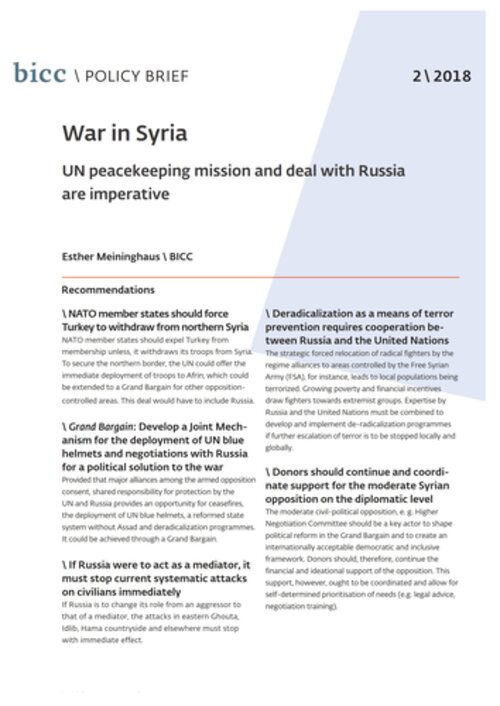Publications
War in Syria: UN peacekeeping mission and deal with Russia are imperative
Release Date
2018-02
Language
- English
Topics
- –
In BICC's recent Policy Brief "War in Syria: UN peacekeeping mission and deal with Russia are imperative", Esther Meininghaus analyses key trends in the Syrian war and stresses the imperative of a UN peace mission as part of a Grand Bargain with Russia. The author outlines the following recommendations:
NATO member states should force Turkey to withdraw from northern Syria
NATO member states should expel Turkey from membership unless, it withdraws its troops from Syria. To secure the northern border, the UN could offer the immediate deployment of troops to Afrin, which could be extended to a Grand Bargain for other opposition-controlled areas. This deal would have to include Russia.
Grand Bargain: Develop a Joint Mechanism for the deployment of UN blue helmets and negotiations with Russia for a political solution to the war
Provided that major alliances among the armed opposition consent, shared responsibility for protection by the UN and Russia provides an opportunity for ceasefires, the deployment of UN blue helmets, a reformed state system without Assad and deradicalization programmes. It could be achieved through a Grand Bargain.
If Russia were to act as a mediator, it must stop current systematic attacks on civilians immediately
If Russia is to change its role from an aggressor to that of a mediator, the attacks in eastern Ghouta, Idlib, Hama countryside and elsewhere must stop with immediate effect.
Deradicalization as a means of terror prevention requires cooperation between Russia and the UN
The strategic forced relocation of radical fighters by the regime alliances to areas controlled by the Free Syrian Army (FSA), for instance, leads to local populations being terrorized. Growing poverty and financial incentives draw fighters towards extremist groups. Expertise by Russia and the UN must be combined to develop and implement de-radicalization programmes if further escalation of terror is to be stopped locally and globally.
Germany and other donors should continue and coordinate support for the moderate Syrian opposition on the diplomatic level
The moderate civil-political opposition, e. g. Higher Negotiation Committee should be a key actor to shape political reform in the Grand Bargain and to create an internationally acceptable democratic and inclusive framework. Donors should, therefore, continue the financial and ideational support of the opposition. This support, however, ought to be coordinated and allow for self-determined prioritisation of needs (e.g. legal advice, negotiation training).
PDF-Download
BICC_Policy_Brief__2_18.pdf
[English] (262.43 KB)

Cite as
@techreport{Meininghaus2018,
author = "Esther Meininghaus",
title = "War in Syria: UN peacekeeping mission and deal with Russia are imperative",
latexTitle = "War in Syria: UN peacekeeping mission and deal with Russia are imperative",
publisher = "BICC",
number = "2",
institution = "BICC",
type = "BICC Policy brief",
year = "2018",
address = "Bonn",
}
Document-Type
BICC Policy brief
Publisher
BICC
Place
Bonn
Countries/Region
Syria



